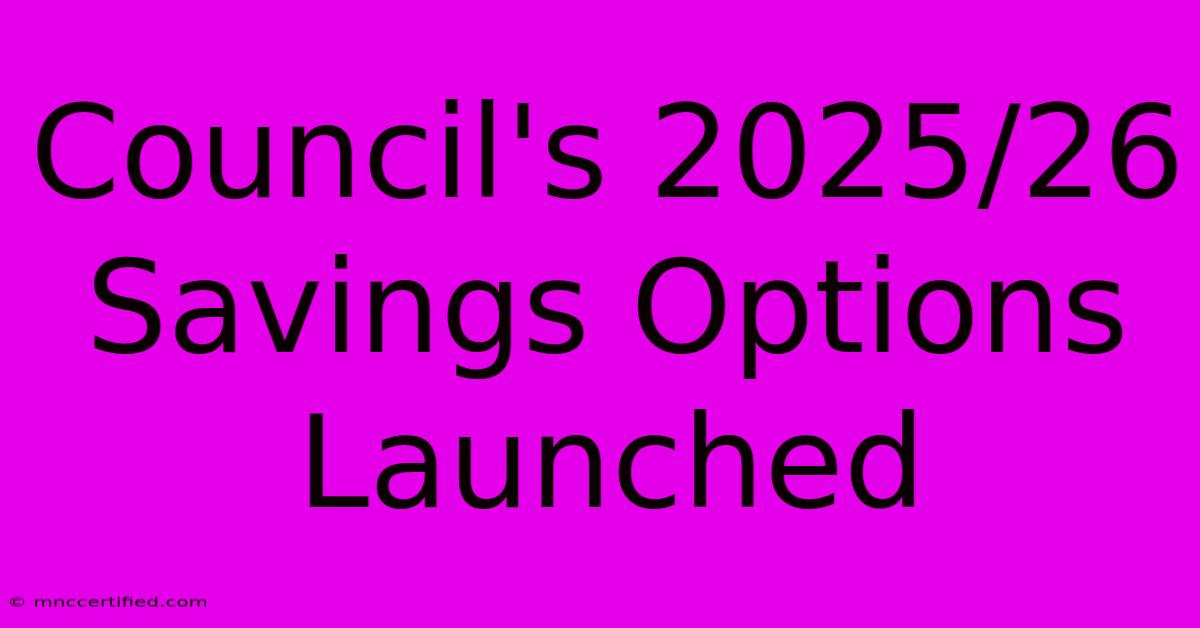Council's 2025/26 Savings Options Launched

Table of Contents
Council's 2025/26 Savings Options Launched: A Closer Look at Proposed Budget Cuts
Local councils across the nation face increasing financial pressures. To address these challenges and balance the budget for the upcoming 2025/26 fiscal year, many are launching new savings initiatives. This article delves into the details of these recently announced savings options, examining their potential impact on local services and residents.
Understanding the Financial Challenges Facing Local Councils
Before diving into the specifics of the proposed savings, it's crucial to understand the context. Councils are facing a perfect storm of financial difficulties, including:
- Reduced government funding: Central government grants have been declining in recent years, leaving councils with a smaller budget to work with.
- Inflationary pressures: Rising costs for everything from energy to staffing are significantly impacting council budgets, requiring them to find ways to offset these expenses.
- Increased demand for services: Many councils are experiencing a surge in demand for essential services, such as social care and housing support, straining already limited resources.
These combined factors have forced councils to explore various cost-saving measures, leading to the launch of the 2025/26 savings options.
Key Savings Options Proposed for 2025/26
The specific savings options vary depending on the local council. However, some common themes are emerging across the country. These include:
1. Service Reductions and Efficiency Improvements
Many councils are proposing reductions in the scope or frequency of certain services. This might involve:
- Reduced library opening hours: Shorter opening times or potential closures of smaller branches.
- Changes to waste collection services: Shifting to less frequent collections or altering recycling schemes.
- Consolidation of administrative functions: Merging departments or streamlining processes to reduce staffing costs.
These changes aim to improve efficiency and reduce operational expenditure without completely eliminating essential services.
2. Increased Charges and Fees
Another common approach involves raising charges for certain services. This could manifest as:
- Higher parking fees: Increased charges in council-run car parks.
- Increased council tax: A rise in the amount residents pay annually towards council services.
- Higher charges for leisure facilities: Increased fees for swimming pools, gyms, and other recreational activities.
While unpopular, increasing charges can help generate additional revenue to offset budget shortfalls.
3. Asset Sales and Property Disposals
Some councils are considering selling off non-essential assets to raise capital. This might include:
- Sale of council-owned land: Selling underutilized land for development.
- Disposal of surplus property: Selling buildings or facilities no longer required.
- Review of property portfolios: Identifying opportunities for consolidation or more efficient utilization of existing properties.
Public Consultation and Engagement
It is vital that the public has an opportunity to engage with and provide feedback on these proposed savings options. Most councils are undertaking public consultations to gather input before making final decisions. Actively participating in these consultations is crucial to ensure your voice is heard and that the council considers the impact of these changes on the community.
The Impact on Local Communities
The potential impacts of these savings options are far-reaching and will vary depending on the specifics of each council's plan. Some potential consequences include:
- Reduced access to essential services: This could disproportionately affect vulnerable members of society.
- Increased financial burden on residents: Higher charges and taxes could impact household budgets.
- Potential job losses: Service reductions may lead to staff redundancies.
It's important to carefully review your council's specific proposals and understand their potential consequences for your local community.
Finding More Information
To stay informed about your local council's 2025/26 budget and proposed savings options, visit your council's official website. Look for sections on budgeting, finance, or public consultations. You can also attend council meetings and engage directly with your elected representatives.
This article provides a general overview. Specific details will vary significantly from council to council. Active engagement with your local authority is essential for understanding and influencing the decisions that will shape your community's future.

Thank you for visiting our website wich cover about Council's 2025/26 Savings Options Launched. We hope the information provided has been useful to you. Feel free to contact us if you have any questions or need further assistance. See you next time and dont miss to bookmark.
Featured Posts
-
Elizabeth Line Service Disruption In London
Nov 27, 2024
-
Josh Sherrill Insurance Agency
Nov 27, 2024
-
Double Injury Boost For Arsenal
Nov 27, 2024
-
Arsenals Tierney Returns
Nov 27, 2024
-
Feyenoord Vs Man City Champions League
Nov 27, 2024